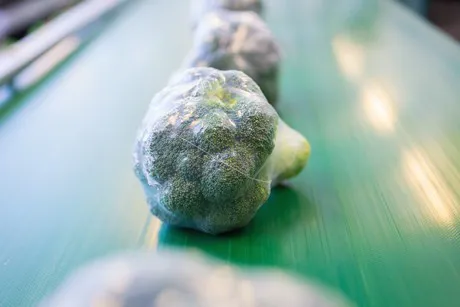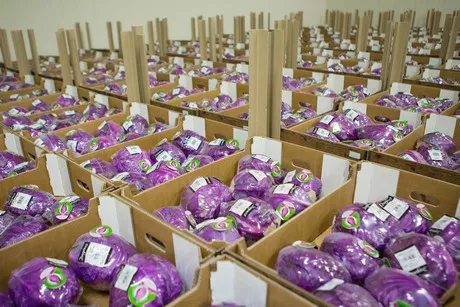Marcus Gillioen is at the helm of Flexfilm, a commercial enterprise and consultancy specialised in plastic films. The company works closely with European film producers who are also represented in the Benelux. The Dutch company from Schoonhoven was founded 23 years ago, and they’re facing the future with confidence, regarding the current debate surrounding plastic packaging as well.
“Our company is hyper-specialised in plastic films. We’re an important player particularly in special, technically high-quality films. We’re even a market leader with polyolefin shrink film in the Benelux. Oxheart cabbage, broccoli and bell peppers are among the products packed with this film, resulting in an extended shelf life for sales. About 60 to 65 per cent of our products is meant for the food industry. We don’t just supply shrink film to packers and growers, but we also supply flowpack packaging, which are used for potatoes, herbs, leek and chicory.”

With plastic film as their most important product, the current social debate regarding the reduction of plastic material in packaging is of major influence on Flexfilm. However, Marcus is facing these developments with confidence. “We’re seeing the debate regarding plastic reduction as a wonderful opportunity to be distinctive on the market. The supply chain needs more specialists and people who know about plastic. We can offer that knowledge and experience. That way, we can help our customers to reduce their use of plastic, think of smaller packaging, for example, or thinner plastics, and whether it’s actually necessary to pack certain products. The use of plastic films should, after all, add value to the product. For instance, cling film ensures a longer shelf life of vegetables and contributes considerably to the reduction of food waste.”
Not just customers are helped to reduce their use of plastic. Flexfilm is also dedicated to reducing the amount of plastic in their own production process. “We’re now working on the development of films of 9 micron, that’s extremely thin and uses a lot less plastic.” Flexfilm is focused on the use of mono-materials as well. “With the use of mono-materials, plastic becomes more suitable for recycling compared to plastic films of multiple layers, so-called multilayers. After all, there are various types of plastic and some are better for circular economies than others. For example, PET and PE plastics can be reused better than other types. However, we currently still have to wait for the research into recycling plastics, because we don’t quite know how it will affect food safety.”

Marcus is facing the future of compostable bioplastics made of corn or other starches with a level head. “We also offer these bioplastics, but I’ve noticed some disadvantages. Firstly, it’s true these are more biodegradable than plastics, but they do have to end up in the right waste flow for it to matter. We see bioplastic ending up with regular plastic waste too often. Secondly, most of these films can only be composted in industrial compost installations, and consumers don’t have great access to these. Thirdly, the production of bioplastics uses valuable agricultural land, that’s a shame. We therefore think bioplastics will mostly be useful in niche applications.”
“We think bio-based films, created from a basis of sugarcane, are a better alternative. These might not be biodegradable, bu they’re just as recyclable as the standard films, and their advantage is that the material is renewable. In the end, we therefore think it’s better to devote ourselves to the development of thinner plastics and the recycling of this material in the circular economy.”
For the future, Marcus expects an increase in demand for special films. “Looking at the amount of plastics sold, I predict a decrease in volume in the future. However, values will increase because we expect a rise in demand for special films and the expertise of our company. For example, we’re seeing a rise in demand for films with preprinted user information, so that labels aren’t necessary.”
For more information:
Marcus Gillioen
Flexfilm
Achterwetering 35
2871 RK Schoonhoven, the Netherlands
+31(0)182 38 87 02
